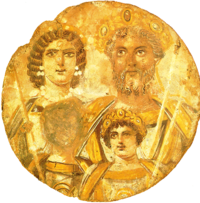Severan
| Roman imperial dynasties | |||
| Severan dynasty | |||
 The Severan Tondo, depicting Septimius Severus and (most) of his family. |
|||
| Chronology | |||
| Septimius Severus | 193–198 | ||
| —with Caracalla | 198–209 | ||
| —with Caracalla and Geta | 209–211 | ||
| Caracalla and Geta | 211–211 | ||
| Caracalla | 211–217 | ||
| Interlude: Macrinus | 217–218 | ||
| Elagabalus | 218–222 | ||
| Alexander Severus | 222–235 | ||
| Dynasty | |||
|
Severan dynasty family tree All biographies |
|||
| Succession | |||
|
Preceded by Year of the Five Emperors |
Followed by Crisis of the Third Century |
||
The Severan dynasty was a Roman imperial dynasty, which ruled the Roman Empire between 193 and 235. The dynasty was founded by the Roman general Septimius Severus, who rose to power as the victor of the 193-197 civil war.
Although Septimius Severus successfully restored peace following the upheaval of the late 2nd century, the dynasty was disturbed by highly unstable family relationships, and constant political turmoil, foreshadowing the imminent Crisis of the Third Century. It was the last lineage of the Principate founded by Augustus.
Lucius Septimius Severus was born to a family of Phoenician equestrian rank in Leptis Magna,the Roman province of Africa proconsularis, in modern-day Libya. He rose through military service to consular rank under the later Antonines. Proclaimed emperor in 193 by his legionaries in Noricum during the political unrest that followed the death of Commodus, he secured sole rule over the empire in 197 after defeating his last rival, Clodius Albinus, at the Battle of Lugdunum.
Severus fought a successful war against the Parthians and campaigned with success against barbarian incursions in Roman Britain, rebuilding Hadrian's Wall. In Rome, his relations with the Senate were poor, but he was popular with the commoners, as with his soldiers, whose salary he raised. Starting in 197, the influence of his Praetorian prefect Gaius Fulvius Plautianus was a negative influence; the latter was executed in 205. One of Plautianus's successors was the jurist Aemilius Papinianus. Severus continued official persecution of Christians and Jews, as they were the only two groups who would not assimilate their beliefs to the official syncretistic creed.
...
Wikipedia
